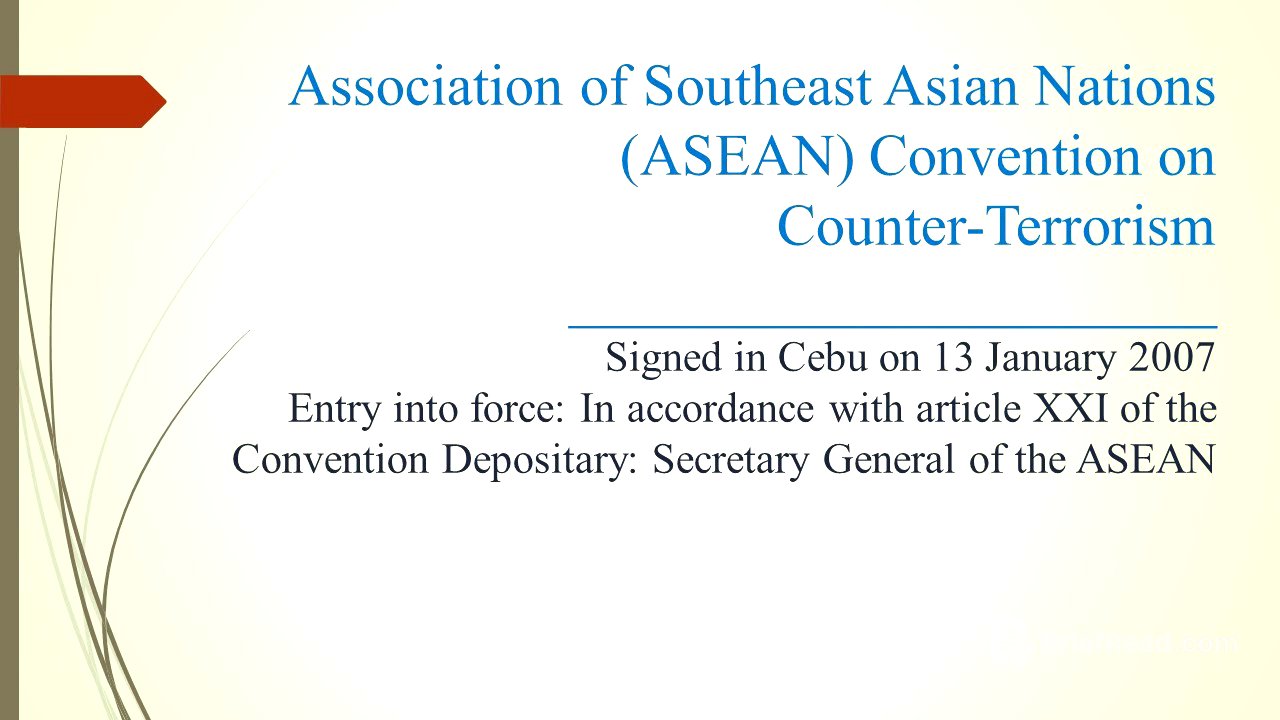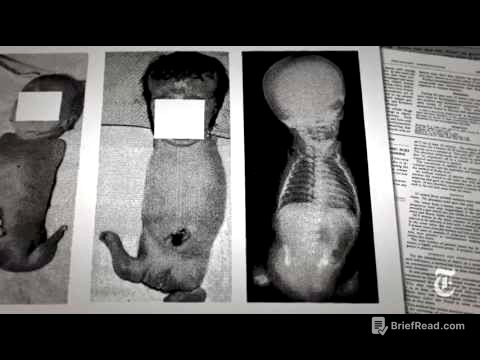TLDR;
This video presents the ASEAN Convention on Counter-Terrorism, signed in 2007. It outlines a framework for regional cooperation to prevent and suppress terrorism, enhance cooperation among law enforcement agencies, and address the root causes of terrorism. The convention also covers jurisdictional issues, fair treatment of individuals, and mutual legal assistance.
- Establishes a framework for regional cooperation in countering terrorism.
- Defines criminal acts of terrorism based on existing international treaties.
- Promotes cooperation in areas such as information exchange, border control, and capacity building.
- Addresses jurisdictional issues, extradition, and fair treatment of individuals.
Preamble: Parties, Principles, and Concerns [0:00]
The ASEAN Convention on Counter-Terrorism involves Brunei, Cambodia, Indonesia, Laos, Malaysia, Myanmar, Philippines, Singapore, Thailand, and Vietnam, collectively referred to as "the parties." The convention references the UN Charter, international law, counter-terrorism conventions, and UN resolutions, reaffirming commitment to human rights, fair treatment, the rule of law, and principles in the Treaty of Amity and Cooperation in Southeast Asia. It emphasizes that terrorism should not be associated with any religion, nationality, or ethnic group, recalling previous ASEAN declarations and action programs against terrorism. The document expresses deep concern over the threat terrorism poses to innocent lives, infrastructure, the environment, and regional stability, stressing the importance of addressing the root causes of terrorism.
Article 1: Objective [3:32]
The primary objective of this convention is to establish a framework for regional cooperation to counter, prevent, and suppress terrorism in all its forms. It aims to deepen cooperation among law enforcement agencies and relevant authorities of the participating parties in encountering terrorism.
Article 2: Criminal Acts of Terrorism [3:52]
This article defines "offense" for the convention's purposes by referencing a list of international treaties. These include conventions related to aircraft seizure, aviation safety, crimes against internationally protected persons, hostage-taking, nuclear material protection, airport violence, maritime navigation safety, terrorist bombings, terrorism financing, and nuclear terrorism. A party not already part of a listed treaty can declare it not included in the convention's application to them, with the declaration ceasing effect once the treaty is in force for that party. Similarly, a party ceasing to be a party to a listed treaty can make a declaration regarding that treaty.
Article 3: Sovereign Equality, Territorial Integrity, and Non-Interference [7:39]
The parties are obligated to fulfill their duties under this convention in accordance with the principles of sovereign equality, territorial integrity of states, and non-interference in the internal affairs of other parties.
Article 4: Preservation of Sovereignty [7:58]
This article clarifies that the convention does not authorize any party to exercise jurisdiction or perform functions in another party's territory that are exclusively reserved for that other party's authorities under its domestic laws.
Article 5: Non-Application [8:16]
The convention does not apply when the offense is committed within a single party, the alleged offender and victims are nationals of that party, the alleged offender is found in that party's territory, and no other party has a basis to exercise jurisdiction under the convention.
Article 6: Areas of Cooperation [8:39]
The areas of cooperation under this convention may include measures to prevent terrorist acts, prevent the use of territories for terrorist purposes, suppress the financing of terrorist acts, prevent the movement of terrorists through border control, promote capacity building, enhance public awareness, enhance cross-border cooperation, enhance intelligence exchange, develop regional databases, strengthen capability to deal with CBRN (chemical, biological, radiological, nuclear) terrorism and cyber terrorism, undertake research and development on counter-terrorism measures, encourage the use of video conferencing for court proceedings, and ensure that those involved in terrorist acts are brought to justice. Subject to consent, parties will cooperate to address the root causes of terrorism.
Article 7: State Jurisdiction [11:16]
A party must establish jurisdiction over offenses covered in Article 2 when the offense is committed in its territory, on a vessel or aircraft flying its flag, or by a national of that party. A party may also establish jurisdiction when the offense is committed against a national of that party, against a state or government facility abroad, to compel that party to act or abstain from acting, or by a stateless person with habitual residence in its territory. Additionally, a party must establish jurisdiction when the alleged offender is present in its territory and is not extradited to a party with established jurisdiction. The convention does not exclude any criminal jurisdiction established by a party's domestic laws.
Article 8: Fair Treatment [12:57]
Any person taken into custody or subjected to measures under this convention is guaranteed fair treatment, including all rights and guarantees in conformity with the laws of the party in whose territory they are present and applicable international law, including human rights law. Upon receiving information that a person who has committed an offense covered in Article 2 may be present in its territory, the party concerned must take measures to investigate the facts. If warranted, the party must take appropriate measures to ensure the person's presence for prosecution or extradition. The person is entitled to communicate with a representative of their state, be visited by a representative, and be informed of their rights. When a party takes a person into custody, it must notify parties with established jurisdiction and, if advisable, other interested parties.
Article 9: General Provisions [15:49]
The parties should adopt measures, including national legislation, to ensure that offenses covered in Article 9 are not justifiable under any circumstances. The parties shall establish channels of communication between their competent agencies to facilitate the exchange of information to prevent the commission of offenses. The party where the alleged offender is prosecuted shall communicate the status of the case to other parties claiming jurisdiction.
Article 10: Status of Refugees [16:59]
Parties must take appropriate measures, in conformity with their domestic laws and international law, including human rights standards, before granting refugee status to ensure that the asylum seeker has not planned, facilitated, or participated in terrorist acts.
Article 11: Rehabilitative Programs [17:29]
The parties should endeavor to promote the sharing of best practices on rehabilitative programs, including social reintegration, for persons involved in the commission of offenses covered in Article 2, with the objective of preventing the perpetration of terrorist acts.
Article 12: Mutual Legal Assistance in Criminal Matters [17:55]
The parties shall afford the widest measure of assistance in connection with investigations or criminal proceedings brought in respect of the offenses covered in Article 2, in conformity with their domestic laws. Parties that are also parties to the treaty on Mutual Legal Assistance in Criminal Matters done in Kuala Lumpur on November 29, 2004, will carry out their obligations under paragraph one of this article in conformity with that treaty.
Article 13: Extradition [18:32]
If a party in whose territory an alleged offender is present does not extradite that person, it is obliged to submit the case to its competent authorities for prosecution. The offenses covered in Article 2 are deemed included as extraditable offenses in any extradition treaty existing between the parties. A party that makes extradition conditional on the existence of a treaty may consider this convention as a legal basis for extradition.
Article 14: Political Offenses Exception [20:02]
None of the offenses covered in Article 2 shall be regarded as a political offense for the purposes of extradition or mutual legal assistance. A request for extradition or mutual legal assistance based on such an offense may not be refused on the sole ground that it concerns a political offense.
Article 15: Designation of Central Authorities or Coordinating Structures [20:45]
Each party shall designate a central authority or coordinating structure to enhance cooperation under this convention.
Article 16: Implementation Monitoring and Review [20:58]
The relevant Asian sectoral bodies involved in Asian cooperation on countering terrorism shall be responsible for monitoring and reviewing the implementation of this convention.
Article 17: Confidentiality [21:15]
Each party must preserve the confidentiality of documents, records, and information received from any other party. No document, record, or other information obtained pursuant to this convention shall be disclosed to any other party without the prior written consent of the providing party.
Article 18: Relationship with Other International Instruments [21:44]
This convention does not diminish obligations between the parties under other international agreements, nor does it prevent the parties from providing assistance to each other under other international agreements or their domestic laws.
Article 19: Settlement of Disputes [22:10]
Any dispute between the parties arising from the interpretation or application of this convention shall be settled amicably through consultation and negotiation or other peaceful means.
Article 20: Ratification, Approval, and Depository [22:32]
The convention is subject to ratification or approval according to the internal procedures of the parties. The instruments of ratification or approval shall be deposited with the Secretary-General of ASEAN, who will inform the other parties.
Article 21: Entry into Force and Amendment [22:58]
The convention enters into force 30 days after the deposit of the sixth instrument of ratification or approval with the Secretary-General of ASEAN. For parties ratifying or approving after this, it enters into force on the date their instrument is deposited. The convention may be modified or amended by mutual written consent of the parties.
Article 22: Withdrawal [24:26]
Any party may withdraw from this convention after its entry into force. Withdrawal is notified via an instrument to the Secretary-General of ASEAN and takes effect 180 days after receipt.
Article 23: Registration [25:05]
The Secretary-General of ASEAN shall register this convention with the United Nations Secretariat. The convention was done at Cebu, Philippines, on January 13, 2007, in a single original copy in the English language.









